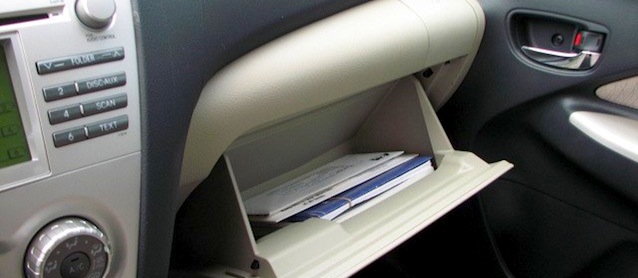I’m no etymologist, but I’ve always been intrigued by the origin of words – especially as it applies to cars. There are, after all, a number of terms that we use every day in our industry that make no sense at all. That is, of course, until you understand where they come from.
To satisfy my own curiosity, as well as to give everyone some fun facts to share with customers, I’ll be doing a little bit of research on the origin of industry terms and posting my findings here from time to time.
To start off, let’s take a look at where the terms “glove box” and “jockey box” come from.
Of course, I’m referring to that large lockable compartment automakers build into the dashboard. But the terms used to describe it are odd. After all, neither gloves nor jockeys have anything to do with driving a car.
So where did the terms come from? Popular education website eHow.com explains:
In the early days of the automobile the use of gloves was considered essential, not only as a style statement for the discriminating, often wealthy driver wearing a pair of white, gauntlet gloves, but also for utility reasons to keep the hands warm. Many early automobiles didn’t come with heaters, and driver and occupants were forced to dawn heavy gloves to protect their hands. […]
Many early vehicles did not have enclosed cabs and driving to church with the family on those cold Sunday mornings required everyone to wear a pair of gloves. It just makes sense to keep the gloves in a special compartment in the car so they would always be handy.
In England, and in certain areas of the northwest United States, glove boxes are still referred to as “jockey boxes”. The World Detective website is one of few that offers a plausible explanation for this term. A jockey, of course, is a person who works with horses, and according to this site, the term jockey carried over to include one who works on horseless carriages. A bit of a stretch, possibly, but it’s the only explanation available. [more]
So there you have it. The next time a customer asks you to take a look at a glove box’s broken lock or peeling trim, you can drop a little knowledge that’s sure to impress.

Never heard the term “jockey box” myself?
It’s definitely not as common as “glove box”, but I hear it now and again. It’s one of those odd colloquialisms.
iJockey box” is a common term in Montana and neighboring states. I’m not sure that it’s accurate, but I thought that it was related to side-mounted “jockey boxes” that were used on old horse-drawn carriages to store food and drink.
Interesting explanation. But they didn’t “dawn heavy gloves to protect their hands”; they DONNED the gloves.
A jockey box is also the box on the back of a wagon. Seeing how most people in the Midwest is related to early settlers who traveled by wagon, it makes sense that this would carry.
In Turkeye, we call it the “Torpido Gözü”, which means the “torpedo compartment”, and there is no detail about the origin of this nomenclature. It’s pretty mysterious. 😀
My English uncle would refer to the “glove boot” (“boot” being the equivalent to “trunk” in American English). He was born just after the end of the First World War and I think the term would get been more current between the 1930s and the 1970s. Although glove box is the commonest term I’ve heard used in U.K./Ireland, you occasionally hear the compartment being referred to as a glove boot.